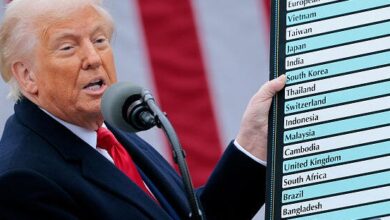Small businesses push for exemptions from Trump tariffs

Small business owners across the United States are facing a dire situation as they grapple with the impact of steep new tariffs on foreign goods. The higher import taxes imposed by the Trump administration on key trading partners are posing a serious threat to the livelihoods of these entrepreneurs.
Senator Ed Markey, a prominent member of the U.S. Senate Committee on Small Business and Entrepreneurship, has called for relief for small businesses from these tariffs. In a letter to the Small Business Administration (SBA), Markey criticized the tariffs as being “recklessly imposed” and urged for exemptions for smaller enterprises. He pointed out that while the Trump administration has granted exemptions to corporate giants like Apple and Google, small businesses have been left vulnerable to the rising costs caused by the tariffs.
The impact of these tariffs is particularly harsh on small businesses, which operate on thin profit margins and lack the financial resources to absorb sudden price shocks or navigate changes in the supply chain. Under President Trump, tariffs on Chinese imports have soared to as high as 145%, while products from other countries are subject to 10% tariffs. Despite the administration’s claims that the tariffs will protect domestic manufacturing and generate revenue, small businesses are feeling the brunt of the consequences.
Former SBA head Isabel Guzman emphasized the challenges that small businesses face due to the tariffs, noting their lack of cash reserves and supply chain diversity. The short-term impact of the tariffs is hitting small businesses hard, making it difficult for them to sustain their operations.
One such business feeling the impact is Kilo Brava, a U.S.-based lingerie company that manufactures its products in China. Founder Kristin Bear recently expressed concerns that the increased tariffs could force her to cancel a significant amount of orders, amounting to approximately $500,000.
The Trump administration’s defense of the tariffs as a means to boost domestic manufacturing and economic growth has not alleviated the concerns of small business owners. As these entrepreneurs struggle to navigate the challenges posed by the tariffs, the need for relief and exemptions becomes increasingly urgent.
In conclusion, the detrimental effects of the steep tariffs on small businesses cannot be ignored. It is essential for policymakers to consider the unique vulnerabilities of these enterprises and provide them with the support they need to weather this economic storm.





